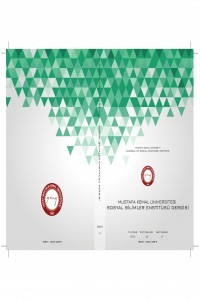An Investigation On College Students' Conceptual Understanding Of Quantum Physics Topics/Üniversite Öğrencilerinin Quantum Fiziğini Kavramsal Anlamaları Üzerine Bir Araştırma
Abstract Today, it is accustomed to investigate students who have difficulties about understanding quantum concepts and several findings indicated that they do face quite challenges about learning this difficult subject. In this study, we aim to explore students' conceptual understanding and knowledge of the topics of quantum physics. In order to achieve this goal we designed a questionnaire based on previous investigations and conceptual questions in different studies. Senior and junior college students enrolled at school of education and science department agreed to participate in the study. It was administered to 394 students at Erciyes University. Of them, 83 and 55 were senior and junior pre-service science teachers, 102 and 72 were senior and junior physics students, respectively. Rest of the participants was consisted of senior class chemistry students. At the end of this paper, we analyzed the results of questionnaire and observed that having more experience with the quantum concepts makes students to remember them easier. Results revealed that students struggle in understanding quantum physics and that was not a surprise because recent studies showed that these concepts were harder to learn than other physics concepts. In addition, the questionnaire designed for this study passed the reliability with KR-20 value of 7.83 and validity tests. Keywords: Quantum physics, science teaching, physics education. Günümüzde kuantum kavramlarının üniversite öğrencileri tarafından hangi seviyede anlamaları üzerine araştırma yapmak yaygın olmakla beraber bu konudaki makalelerde öğrencilerin konuları anlamalarının diğer fizik konularına göre daha zor olduğu sonuçlarına varılmaktadır. Bu araştırmada öğrencilerin kuantum fiziğinde yer alan kavramların anlaşılmasının araştırılması amaçlanmıştır. Bu amaca ulaşmak için daha önceden yapılan çalışmalardaki veri toplama anketlerini kullanarak yeni bir anket oluşturulmuştur. Üniversitesinin fizik, kimya ve fen eğitimi bölümlerinde okuyan öğrenciler bu çalışmada gönüllü yer almayı kabul etmişlerdir. Erciyes Üniversitesinde okuyan 394 öğrenciye bu anketi uyguladık. Bunlardan 83 tanesi 3.sınıf ve 55 tanesi ise 4.sınıfta okuyan fen bilgisi öğretmen adaylarıdır. Ayrıca, 102 tanesi 3.sınıf ve 72 tanesi 4.sınıfta okuyan fizik bölümü öğrencileri idi. Diğer öğrenciler ise kimya bölümünde okuyan 3.sınıf üniversite öğrencisidir. Çalışma sonucunda ise elde edilen bulgular analiz edilmiştir. Elde edilen bulgularda öğrencilerin bu kavramları çok fazla öğrenemedikleri görülmüştür ve bu sonuç bizim için sürpriz değildir çünkü bu fizik dalı araştırmalar sonucunda daha zor olduğu elde edilmiştir. Ayrıca, kullanılan veri toplama aracının geçerlilik testleri sonuçları yeterli seviyede bulunmuştur. Anahtar Kelimeler: Kuantum fiziği, fen öğretimi, fizik eğitimi
Anahtar Kelimeler:
Kuantum fiziği, fen öğretimi, fizik eğitimi
___
- References
- Akarsu, B. (2010). ”Einstein's redundant triumph “quantum physics”: An extensive study of teaching /learning quantum mechanics in college “, Lat. American Journal of Physics. Educ., 4, 2, 30-43.
- Baily, C., & Finkelstein, N. (2009). “Development of quantum perspectives in modern physics ”, Phys. Rev. St Phys. Educ. Res. 5, 20-27.
- Baily, C., & Finkelstein, N. (2010). “Refined characterization of student perspectives on quantum physics”, Phys. Rev. St Phys. Educ. Res. 6, 345-354.
- Bao, L., & Redish, E. (2001). “Understanding probabilistic interpretations of physical systems: A prerequisite to learning quantum physics”, American Journal of Physics, 70, 3, 210- 221.
- Carr, L., & McKagan, S. (2009). “Graduate quantum mechanics reform”, American Journal of Physics, 77, 4, 308- 321.
- Calıskan, S., Selcuk, G., & Erol, M. (2009). “Student understanding of some quantum physical concepts”, Lat. American Journal of Physics. Educ., 3, 2, 2-15.
- Hobson, A. (2004). “Electrons as field quanta: A better way to teach quantum physics in introductory general physics courses”, American Journal of Physics, 73, 7, 630-641.
- Isham, C.J. Linden, N. (1994), “Continuous histories and the history group in generalized quantum theory”,
- Lipshitz, I. (2002). “Thirty-four challenges to meet before excimer laser technology can achieve super vision”, Journal of Refractive Surgery, 18, 20-33.
- Kalkanis, G.. Hadzidaki, P., & Stavrou, D. (2002), “An instructional model for a radical conceptual change towards quantum mechanics concepts”, Science Education, 87, 2, 257–280.
- McKagan, S., & Wieman, C, (2006), “Exploring student understanding of energy through the quantum mechanics Conceptual survey”, AIP Conference Proceedings, 818, 6-18
- McKagan, S., Perkins, K., Dubson, M., Malley, C., Reid, S., LeMaster, R., & Wieman, C, (2008), “Developing and researching PhET simulations for teaching quantum mechanics”, American Journal of Physics, 76, 4, 406.
- Morgan, J, Wittmann, M, Thompson, J, (2004), “Student understanding of tunneling in quantum mechanics: examining Interview and survey results for clues to Student Reasoning”, Physics Education, 3, 23, 23-27.
- Ozdemir, E., & Erol, M, (2010). “Teaching uncertainty principle by hybrid approach: single slit diffraction experiment”, Lat. American Journal of Physics. Educ., 4, 3, 3-14.
- Pospiech, G. (2004). Moderne quanten physik im Unterricht, Logos Verlag, Berlin.
- Rovelli, C. (2000). “Notes for a brief history of quantum gravity.” 9th Marcel Grossmann Meeting in Rome, p. 1-32.
- Serway, R., & Beichner, R. (2005). Fizik 3, Modern Fizik (çev K. Çolakoğlu), Istanbul, Palme pubs., 1382-1386.
- Singh, C. (2001). “Students understanding of quantum mechanism”, American Journal of Physics, 69, 8, 885.
- Wittmann, M, Steinberg, R, Redish, E, (2002). “Investigating student understanding of quantum physics: Spontaneous models of conductivity”, American Journal of Physics, 70, 3, 218-226.
- Wuttiprom, S., Chitaree, R., & Soankwan, C. Johnston, D. (2008). “Developing a conceptual survey in fundamental quantum physics”, Thai Journal of Physics, Series 3, 172.
- Wuttiprom, S. (2008). “Development and use of a conceptual survey in introductory quantum physics”, Unpublished doctoral dissertation.
- Başlangıç: 2004
- Yayıncı: Hatay Mustafa Kemal Üniversitesi
Sayıdaki Diğer Makaleler
Gamze SELÇUK, Burak KARABEY, Serap ÇALIŞKAN
Esin ŞAHİN, Sedat MADEN, Mehmet KARDAŞ, Abdullah ŞAHİN
Lauren CIFUENTES, Zahira MERCHANT, Ömer VURAL
